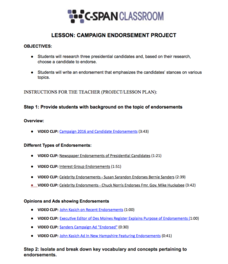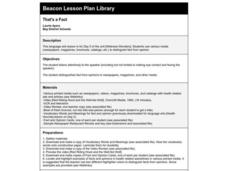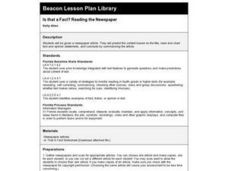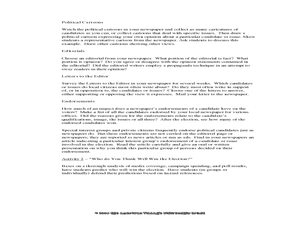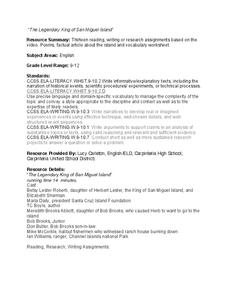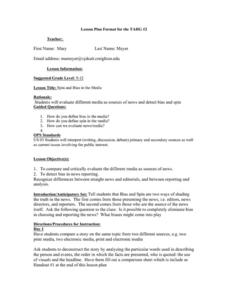Newseum
Propaganda Through History: Analyzing Historical Sources
Working in teams, pairs, or individually, scholars select one resource from a gallery of historical sources and consider which examples might be considered propaganda, the techniques used to persuade audiences, and evaluate how the...
Curated OER
8th Grade Reading Comprehension Success
Augment your eighth grade language arts curriculum with a thorough set of reading comprehension activities and assessments. Focusing on a variety of skills, including vocabulary in context, text structure, main idea, and author's style,...
C-SPAN
Campaign Endorsement Project
So many politicians, so many endorsements! Learn to differentiate between facts as well as the process of endorsements with an informative resource. Class members watch current endorsement videos, research candidates from three different...
Hampton-Brown
From "First Crossing"
Young scholars look closely at four tales taken from the collection of short stories, First Crossing edited by Donald R. Galloby. While examining the life of four teenagers and the lives they lead as U.S. immigrants, your enthusiastic...
Facing History and Ourselves
Free Press Makes Democracy Work
A unit study of the importance of a free press in a democracy begins with class members listening to a podcast featuring two journalists, one from a United States public radio station and one from Capetown, South Africa. The lesson plan,...
Texas Education Agency (TEA)
Mistake, Misrepresentation, and Fraud
Fraud alert! Scholars conduct research about consumer fraud and create a presentation detailing the information they find. Additionally, they research and write a report about lawsuits that resulted in large settlements.
Newseum
Persuasion Portfolios
After class members brainstorm a list of current social and political issues, groups each select a different topic from the list to research. Teams create a portfolio of at least 10 examples of stories about their issue, stories that...
Overcoming Obstacles
Listening Critically
Eschew obfuscation!! High schoolers learn techniques that permit them to listen critically, sort through verbiage used to hide meaning or mislead listeners, and determine the message's validity.
Curated OER
That's a Fact
Third graders use various media (newspapers, magazines, brochures, catalogs, etc.) to distinguish fact from opinion
Curated OER
Is that a Fact? Reading the Newspaper
Fourth graders are given a newspaper article. They predict the content based on the title, read and chart fact and opinion statements, and conclude by summarizing the article. They utilize a worksheet imbedded in this plan to guide their...
Curated OER
The Campaign: Issues and Strategies. What do you think?
Young scholars research a candidate in an election and discuss how the media portrays that candidate and how the media influences voters. In this candidate lesson plan, students also distinguish fact from opinion, look at political...
Curated OER
Turning Literature into News
Students examine the newspaper. In this writing purposes lesson, students read the newspaper and discuss the purpose: to inform, entertain and persuade. Students identify facts and opinions. Students write an article and discuss acts of...
Curated OER
Conversation Lesson: The Necessity of Grammar
Start a conversation to convey proper English grammar. In groups pupils voice their opinion, have well supported disagreements, and explain why they feel as they do. This lesson builds academic discussion skills and fosters a command of...
Curated OER
Nonfiction Text Features
Identify features of a nonfiction article in this language arts lesson. Middle schoolers apply comprehension strategies as they read the parts of the article, and analyze the author's key points. Additionally, they examine information in...
Curated OER
Media Literacy Vocabulary Lesson
Students participate in an introductory lesson that focuses on communication. The two types of extrapersonal and interpersonal are covered. The lesson uses questions in order to guide the class discussion and writing responses.
Curated OER
Good News/Bad News/Who Cares?
Students practice evaluating facts, bringing to bear their own experience, preferences, and international contexts. They recognize that there are many ways of interpreting a single piece of information and form the habit of reflecting...
Channel Islands Film
The Legendary King of San Miguel: Lesson Plan 3 - Grades 9-12
The documentary, The Legendary King of San Miguel Island, introduces the fascinating tale of Herb Lester, his family, and their life on San Miguel Island. Viewers have an opportunity to expand their study of the island and of Lester's...
Curated OER
School Newspaper
Students investigate writing a school newspaper. In this writing a school newspaper lesson, students choose topics that will be included in the school newspaper. Students view online sites about writing articles and break into groups to...
Curated OER
Spin and Bias in the Media
High schoolers compare different types of media. In this media comparison lesson, students will assess the where all types of media gets its information by viewing a video of a news story and critiquing it.
Pennsylvania Department of Education
Analyzing Key Ideas and Details in Nonfiction
Students explore nonfiction texts. In this language arts lesson, students read a nonfiction text and make predictions. Students identify facts and opinions in the text and draw conclusions as they read.
Curated OER
Conducting Research
Third graders conduct research. In this conducting research instructional activity, 3rd graders discuss the importance of nonfiction text in providing factual information. Students write questions about an assigned topic and research...
State Bar of Texas
Wisconsin v. Yoder
How far does freedom of religion truly go? The 1972 Supreme Court case Wisconsin v. Yoder introduces the concept of the free exercise clause of the First Amendment. Individuals examine the case with a short video and open discussion. To...
Curated OER
Popular Culture & Diversity
The topic of cultural diversity is explored with the use of pop songs and lyrics. As a way to celebrate Harmony Day, small groups read, reflect, and present their opinions on how the lyrics they analyzed have expressed a statement of...
NPR
The History of America’s Weed Laws
To understand the laws regarding marijuana use in the United States, you can go all the way back to the 1800's to learn about farming hemp, or you can go back to 2018 when California became the sixth state to legalize recreational...




